http://risingstarrhorserescue.org


Rising Starr Horse Rescue
93 Silver Spring Rd
WILTON, CT 06897
Mailing Address:
93 Silver Spring Rd
WILTON, CT 06897
Phone: 203-257-8345
MAKE AN INQUIRY
View our WEBSITE
EIN: 47-4027991Founded: 2015
View our PHOTO GALLERY
Profile Last Updated April 24, 2025Public Charity
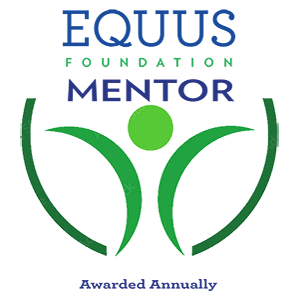
The Mentor Accreditation is awarded annually to an organization that operates at the highest standards for business and equine welfare practices in accordance with EQUUS Foundation guidelines for business and equine welfare practices outlined here.
We welcome you to donate directly to Rising Starr Horse Rescue; Rising Starr Horse Rescue will receive 100% of your donation made here. However, before making a donation, we encourage you to review this organization's Mentor information.
Last Updated: October 1, 2025

MISSION & PROGRAMS
Mission:Rising Starr Horse Rescue saves, rehabilitates, retrains, and rehomes abandoned, neglected, or abused horses. Through equine interactive programs, we educate the public about at-risk horses and the importance of protecting them. By giving America's horses a second chance at life, we give the community the chance to experience the love, patience, and compassion horses have for humans.
Our organization provides programs involved with equine rescue, adoption & retirement
Our organization conducts Equine Assisted Services in accordance with the EQUUS Foundation Guidelines on Qualifications of Organizations Conducting Equine Assisted Services (EAS).
Our organization provides outreach and/or public education programs involving horses.
100% of our total programs and services are equine-related.
Our organization is directly responsible for the care and shelter of equines involved in our programs.
Our organization CURRENTLY uses satellite, overflow, foster, and/or outreach facilities which adhere to all the policies, procedures and practices of our organization or did in the previous year. Facility information is provided for the organization's main, satellite and overflow facilities.
Please describe what steps your organization takes to ensure that:
1) all interactions between your equines and people are mutually beneficial and conducted in accordance with the Guidelines for Human-Equine Interactions stated below;
2) all equines in the care of our organization and/or equines that participate in the organization's program have access to clean drinking water at all times; nutritious food in sufficient quantity, including natural forage such as pasture grass and/or hay; appropriate veterinary, farrier, and dental care; shelter and protection from the weather; sufficient safe space to move around comfortably on a daily basis; and daily opportunity to freely interact and have contact with other equines:
Our multiple programs are all geared toward human and horse interactions. The more the community is involved, the more horses we can train for forever homes. RSHR prides itself on self-care as well, taking care of the people who care for the horses. Our Junior board continues to grow as well as our show team that puts horsemanship above all.
In 2025, we have partnered with Purina to custom fit feeding for our horses to be at the optimal body condition, partnered with Stable secretary that houses feeding, vets, farrier, dentists and training; this allows for easy daily updates to what each horse needs. Our farrier is on site at least once a week and we keep a standing monthly appointment with our dentist.
RSHR has partnered with Agriventures Agway to purchase farms of hay that ensure some consistency in our hay; the weather, of course, dictates much of this. We keep a week of hay (approximately 150 bales in the hayloft and a tractor-trailer on site). RSHR also keeps 2 weeks of grain and weekly deliveries. Our VA property yields 600 large round bales, properly horse cared for, a cutting to ensure hay for our growing VA herd.
Both farms have access to clean, fresh water 24 x 7. Hands are on every horse daily.
Having 2 3500 dually trucks and 2 horse trailers also ensures horses in need can get to the vet, rescued or to events in a timely manner.
Every horse, living in a barn or in pasture, has access to safe shelter, water, grain as needed and forage. All horses get food and water at least twice daily, some up to 8 times depending on body condition. The majority of the horses are turned out with others. on occasion, we have some that either need time, babysitting management or behavior management before they can safely be with others. We have had older stallions, gelded and not be safe for anything other than turn out individually. This certainly is not our preference.
RSHR has a volunteer program geared toward learning, the most important thing being safe. Horses and volunteers are color coordinated to help ensure safe matches for people and horses.
We follow and teach the 5 domains of horse welfare.
Equine Transition Services:
Overview of our programs involved with rescue, rehabilitation, retraining, re-homing and/or retirement:
Executive Director of Rising Starr Horse Rescue, fields phone calls, email, and social media contacts from individuals, law enforcement, and other organizations regarding horses in need. Incoming horses are quarantined off-site if medically necessary or directly brought to RSHR for quarantine, evaluation, vet check. All horses are photographed and brought up to date on Vaccines, worming, dental and hoof care. Horses are then started in a custom program training or rehab program and offered for adoption.
Our horses will be introduced to the public at our fundraisers, on and off-site events, in email, social media, and posted to our website. Training by our trainers and the volunteers continues until they are rehomed.
We offer limited boarding for horses adopted from Rising Starr.
Equine Assisted Services (EAS):
Our organization provides the following Equine Assisted Services (EAS):
Occupational Therapy/Physical Therapy/Speech-Language Pathology
Personal Development Learning
6: Total number of Equine Assisted Service Providers at Rising Starr Horse Rescue
1 Christy Murray DPT, MS, CYT
FACILITY PARTICIPATION:
Rising Starr Horse Rescue
RELATIONSHIP: Independent Contractor
SERVICES PROVIDED:
Occupational Therapy/Physical Therapy/Speech-Language Pathology
DEGREES, LICENSES AND/OR CERTIFICATIONS
Certified by the American Hippotherapy Association.
Doctorate in physical therapy, with specialty training in John Barnes myofascial release, AMERICAN, physical therapy, and Herman Wallace pelvic floor rehabilitation, Certified in integrative lifestyle medicine and medical therapeutic yoga.
2 Elizabeth Herman
FACILITY PARTICIPATION:
Rising Starr Horse Rescue
RELATIONSHIP: Employee
SERVICES PROVIDED:
Personal Development Learning
DEGREES, LICENSES AND/OR CERTIFICATIONS
EAL Accelerated Facilitation Certification, EAL Academy (https://ealacademy.com/); Program Director Rising Starr
3 Eve Bucca
FACILITY PARTICIPATION:
Rising Starr Horse Rescue
RELATIONSHIP: Volunteer
SERVICES PROVIDED:
Personal Development Learning
DEGREES, LICENSES AND/OR CERTIFICATIONS
StandFast Alliance Executive Director and Nurse, EAL Accelerated Facilitation Certification, EAL Academy (https://ealacademy.com/)
4 Jenn T. Peterson
FACILITY PARTICIPATION:
Rising Starr Horse Rescue
RELATIONSHIP: Independent Contractor
SERVICES PROVIDED:
Personal Development Learning
DEGREES, LICENSES AND/OR CERTIFICATIONS
Certification by the Center for EQUUS Coaching (formerly Koelle Institute) (https://equuscoach.com/)
5 Kelly Stackpole
FACILITY PARTICIPATION:
Rising Starr Horse Rescue
RELATIONSHIP: Employee
SERVICES PROVIDED:
Personal Development Learning
DEGREES, LICENSES AND/OR CERTIFICATIONS
EAL Accelerated Facilitation Certification, EAL Academy (https://ealacademy.com/),Founder and Executive Director Rising Starr, Program creator, 40 years of training horses and humans
6 Michelle Lavelle
FACILITY PARTICIPATION:
Rising Starr Horse Rescue
RELATIONSHIP: Volunteer
SERVICES PROVIDED:
Personal Development Learning
DEGREES, LICENSES AND/OR CERTIFICATIONS
EAL Accelerated Facilitation Certification, EAL Academy (https://ealacademy.com/)
Overview of our programs involved with providing EAS to individuals with special needs:
RSHR believes that working with horses, who rely on body language and other nonverbal cues to communi ate, can help people to communicate more effectively, build trust, and develop a more attuned understanding to other’s needs and perspectives. Working with horses can develop emotional awareness, help to learn skills that can help regulate emotions, and become more aware of how an individual's emotion impact others.
Horses are herd animals, and just like in groups of people, herd dynamics shift depending on the situation. By observing how horses communicate and change roles, people can learn to develop leadership skills, communicate effectively, and build confidence. People and teams can develop problem-solving and decision-making skills, think creatively, and become more compromising in their actions. Working with horses can show people how to work together, communicate, listen and develop personal leadership skills to cope with everyday challenges.
The RSHR StandFast Equine includes an equine assisted learning program, a corporate team nuilding program, a Veteran and First Responder Free Program and an equine assisted physical therapy program conducted by a physical therapist.
Physical therapy program with Christy Murray, DPT, MS, CYT
The physical therapy program, offered at Rising Star Horse Rescue, integrates equine-assisted movement with evidence-based therapeutic techniques to promote strength, flexibility, neuromuscular coordination, and nervous system regulation. Through individualized evaluations, treatment plans, and goal-setting, patients engage in dynamic, hands-on therapy incorporating medical therapeutic yoga, equine movement, and other modalities tailored to their unique needs. This holistic approach fosters improved balance, functional mobility, and overall well-being, empowering individuals to achieve their highest potential for strength, wellness, and longevity across their lifespan
For the Veteran and First Responder program, RSHR partnered with StandFast Alliance, which is dedicated to empowering first responders, military and their families with the tools, training and resources they need to face the unique challenges of their service with strength and resilience. One of the StandFast Alliance tools employed to build resiliency that StandFast Equine utilizes is HeartMath - a science-based approach that focuses on the connection between the heart and the brain. It aims to improve emotional well-being, reduce stress, and enhance overall health.
The program is conducted on Fridays when the farm is closed to other activities and involves 2 to 6 horses -- in the pastures, the ring or round pen, a horse handler, a facilitator, and the client, or group. The facilitators received their training and certification from EAL Academy (https://ealacademy.com/), having completed the EAL Academy's EAL Accelerated Facilitation Certification.
These facilitators also conduct equine assisted learning and corporate team building sessions for other clients.
The programs are aimed at improving:
• Communication: Participants learn to communicate with horses through body language, energy, and movement.
• Awareness: Participants learn to observe their own actions and apply them to their lives, better understand the people around them, and learn to cope with emotions and high stress situations.
• Confidence: Participants gain confidence by building a trusting relationship with a horse.
• Leadership: Participants learn to be more authentic and efficient leaders.
• Critical thinking: Participants develop critical thinking skills through task-sequencing, decision-making, and problem-solving.
• Empathy: Participants develop empathy towards themselves and others.
RSHR also offers Equus Coaching® conducted by Jennifer Peterson, a unique experience with horses that offers an individual the opportunity to gain a visceral understanding of how their inner dialogue affects their relationships and everyday life. Equus Coaching is a dynamic approach to personal transformation that combines world-class life coaching with the timeless wisdom of the natural world. In partnership with horses, Equus Coaches guide others on a profound and personal journey to discover their own true nature and gain a vivid awareness of the patterns that shape our lives and world. Equus Coaching is designed for cognitively and physically healthy individuals who are seeking support in their own personal growth. They have a desire to better embody genuine personal leadership, improve the quality of their relationships, and explore a deeper level of trust to their own spiritual connection.
Jenn at RSHR uses approximately 4 horses 1 to 2 days per week. Horses are usually turned out in fields or paddocks when life coaching is conducted. Most sessions are conducted during our normal business hours are individual and private. Occasionally Jenn will do group sessions. Horses are not physically handled. The horses choose to participate or not. What information is shared in sessions is not spoken about. Jenn, the Client and 1 to 2 horses are in an open space. A discussion between Jenn and the client is had. Horses choose to come and be part of the conversation or not depending on energy shared.
Outreach and/or Public Education:
RSHR offers mounted and unmounted instruction. Our volunteer program includes horse care and ownership, and leadership opportunities. We offer AEL and IEA team riding with a focus on higher education in the equine industry.
Our facility offers programs such as corporate team-building, school education, life coaching, and summer programs. Veterans are able to participate free in any program. RSHR also uses the facility to bring in other professionals for clinics in horse training as well as human-horse contact.
All our fundraisers are geared towards enlightening the public on the need that exists to rescue horses in danger and raising funds for the organization. Each volunteer is educated on the reality of horse ownership and proper care.
By investing in our volunteer and educational programs we will have more qualified volunteers, and an enlightened community able to make better choices for America's at-risk horses. A strong volunteer program will allow us to responsibly grow and rescue more horses. Programs include bringing our rescued horses to schools, camps, nursing homes and miscellaneous venues in an effort to further educate and connect the community to the need and find homes for horses in need.
We currently work with Ridgefield High School, Wilton High School, South Salem, NY, Greenwich Country Day, Greenwich Academy, Agricultural schools, Westconn, Fairfield University, West Point, and most schools in Fairfield and Westchester counties. We offer classes to Girl Scouts and Boy Scouts. We participate in community events in all the neighboring towns. Rising Starr added the Forever Foundation /Carter Ranch hands-on training for all our volunteers free of charge. We partner with Stand Fast Alliance to provide free sessions at the rescue to all First Responders. After a session with Stand Fast Alliance, participants can then enjoy one of RSHR's equine programs for free. 2024 we became an accredited EAL program and now offer that program at the farm and off-site to organizations like Silver Hill Hospital monthly and West Point.
Our goal is to inform the surrounding communities the plight of America's horses and the reality and responsibility of horse ownership and strengthen the horse-human bond.
In addition to our Equine Assisted Services, programs listed on our website include:
Education with our Spokes Ponies
Army, Navy and Mayday are the community Spokes-Ponies at Rising Starr. They spread the word and educate all ages on the reality and responsibility of horse ownership and how you can give America's at risk horses a second chance. They are available at your venue, or you can come out to the farm. ( No riding, this is strictly education) Contact the Team at (203) 762-6046 or (203) 257-8345 or via email at Risingstarr100@gmail.com for more information
VOLUNTEER EDUCATION
Volunteers are vital to RSHR. We need a wide variety of helpers at the rescue of all ages. Volunteer opportunities include care of the horses and farm to reading to some of our shy or traumatized horses. We have something for everyone.
Mounted and unmounted Lessons
Includes 12 30 to 60 minute lessons, Natural Horsemanship, Feeding & Care, First Aid, Barn Care, Tacking Up, Trail ride, Responsibility of horsemanship
Summer Camp for 5 to 12 Daily program.
3-5 hour program includes Grooming, Riding Instruction 1 to 1.5 hours, Natural Horsemanship, Feeding & Care, First Aid, Barn Care, Tacking Up, Hiking, Responsibility of horsemanship, Mounted fun time, Trail ride in addition to lessons (always with instructors).
Also, Independent Summer riding program for students who walk, trot, and cantering and/or over 13.
SADDLE UP & WINE Down
Thursday nights, from 6-8 PM 1 hour riding lesson, 1 hour wine down - Calling all ladies and gentlemen!! Invite as many as five friends to take a riding lesson at Rising Starr Horse Rescue in Wilton, and wrap up the evening with some wine and cheese! Rising Starr provides the horses and the instruction, you provide wine and cheese and some friends!
IEA and AEL TEAM
Research/Medical Use of Equines:
Our organization has never made, and would not ever consider making, equines available for research studies or medical training that involves invasive procedures and/or that which may cause pain or suffering to the equine.
Religious Affiliation:
Our organization does not promote religious education, religious purposes, or a specific religious faith or use donations for religious education or religious purposes; require participants to be of a certain faith; require participation in religious, instruction, activities or services; or require participation in prayer, worship, religious instruction or other religious activities as a condition of receiving social or secular services offered.
Auction Donation:
Our organization has never allowed, or would not consider allowing, an equine to be sold, transferred, released, or otherwise placed into possession of any person or organization that would cause or allow the equine to be sold at auction for slaughter.
POLICIES: INTAKE, ASSESSMENT & TRAINING
Prior to a horse being accepted and/or arriving at the facility, the organization has the following policies in place:The owner of a potential equine is interviewed over the phone or in person prior to seeing the equine
The equine is evaluated at its place of residence
The owner completes an application/contract which constitutes the agreement between the owner and our organization when the equine is acquired from the equine's owner other than by seizure or by abandonment
The owner is financially responsible for the shipping of the equine to and from the organization
If health records are not available or are out-of-date, our veterinarian will administer appropriate vaccinations
A health certificate signed by a veterinarian and dated no more than seven days prior to arrival is provided to our organization either prior to or upon arrival of the equine attesting to the health status of the equine
Trial Period: Check all that apply:
Equines are not taken on trial
Upon intake, the organization has the following quarantine policy in place:
The equine is confined to a designated and separate area for isolation and quarantine at the facility for a prescribed period of time
The equine is confined to a designated and separate area for isolation and quarantine off-site for a prescribed period of time
The equine is not quarantined
The typical length of quarantine is: 20 to 30 days
Following arrival of the equine at the facility, the following is performed:
Physical examination to include temperature, pulse and respiration by a trained staff member upon arrival
A Henneke Body Conditioning Score or other body conditioning score is assigned by a trained staff member upon arrival
Photographs are taken of each equine upon arrival at the facility and kept with the equine's health records
Physical examination by a farrier
Physical examination by a dentist
The equine is microchipped if the equine has not been microchipped
Physical examination to include temperature, pulse and respiration by a veterinarian upon arrival
A Henneke Body Conditioning Score or other body conditioning score is assigned by a veterinarian upon arrival
Horses are assessed for following skills and behaviors:
Retrieval from a pasture/paddock
Leading with a halter and lead rope
Temperament, disposition and attitude, such as rated from very calm to very high spirited
Saddling
Bridling
Lunging
Loading onto and unloading off a trailer
Mounting and dismounting
Riding at the walk
Riding at the trot
Riding at the canter
Riding by a beginner and/or unbalanced rider
Jumping
Driving (Pulling a carriage)
Tolerance to unusual objects and loud noises
Known vices, i.e., cribbing, biting, kicking, weaving, stall walking, etc
Grooming
Bathing
Clipping
Tolerance to multiple handlers at the same time
Our organization has the following policies and procedures in place pertaining to the ongoing assessment of horses in its care:
Physical examination by a veterinarian at least annually
The Henneke Body Condition score or other body conditioning score is updated at least annually by the veterinarian
Vaccinations are administered at least annually
Photographs are taken of each equine annually and kept with the equine's health records
Equines at our facility may be treated by an equine chiropractor
Equines at our facility may be treated by an equine acupuncturist
Equines at our facility may be treated by an equine massage therapist
Equines at our facility may be treated by an equine nutritionist
The Henneke Body Condition score or other body conditioning score is updated at least annually by a trained staff member
Photographs are taken of each equine monthly and kept with the equine's health records
Our organization has the following policies and procedures in place pertaining to the weight-carrying or workload capabilities of horses/equines that are ridden in our care:
Our organization evaluates the weight-carrying and workload limitations for each equine that is ridden at least annually
Our organization maintains a written record of the weight-carrying and workload limitations for each equine that is ridden
Our organization does not evaluate the weight-carrying and workload limitations for each equine that is ridden
No equines are ridden; not applicable
The following variables are considered in determining the weight-carrying and workload limitations for each equine that is ridden:
Equine age, weight, breed, body condition, fitness, balance, health and soundness
Equine conformation to include the top line, length of back, strength and width of loin, bone density (measured by the circumference of the cannon bone just below the knee)
Size, shape, condition and angle of the hooves
Participant weight, height, body proportions, balance, fitness and riding skills as well as behavioral issues and safety concerns
Weight and proper fit of the saddle and other equipment
Terrain and footing in the working environment
Duration and frequency of working sessions, as the frequency with which an equine is subjected to maximum weight carrying and/or workload
Nature and pace of work, repetitive or varied, radius of turns, degree of incline and regularity of footing when equine is subject to maximum weight-carrying capacity
Temperature and/or weather conditions
Seasonal impact on the equines' workload and weight-carrying capabilities and limitations
Our organization does not evaluate the weight-carrying and workload limitations for each equine that is ridden
No equines are ridden; not applicable
Horses provided formal training (groundwork or riding): Daily
Additional information about our intake, assessment & training policies and practices:
Our primary veterinarian, New England Equine Practice, conducts the majority of the intake exams, but when New England Equine is not available, especially in emergencies, we call in other veterinarians - most often, Dr. Wendy Roberts Trumbull Animal Hospital. If the equine needs more care, or if we have questions, the equine is sent directly to New England Equine Practice.
For those equines that are examined by a veterinarian prior to intake, we receive a health certificate. Due to the fact that RSHR takes horses in from the continental United States and Puerto, many of our horses are required to have an exam by a veterinarian before traveling to our facility. That exam is counted as an intake exam.
A physical examination is conducted by a trained staff member upon arrival. Intake photos are taken on arrival and our staff checks for lameness, heart rate, pulse. All horses are vaccinated and wormed by the staff if needed.
POLICIES: BREEDING
The organization has the following policies related to breeding and stallions:Our organization does not conduct breeding of equines owned or under the care of our organization.
Our main facility where our organization conducts its programs does NOT breed equines.
One or more of the facilities where our organization conducts its programs, including foster/temporary care facilities, breeds equines
One or more of the facilities where our organization conducts its programs, including foster/temporary care facilities, are permitted to house stallions
POLICIES: EUTHANASIA
The organization has the following policies related to euthanasia:Our organization will never have an equine euthanized for space
Our organization will have an equine euthanized upon the recommendation of the veterinarian if the equine is a threat to itself, other equines, or people
Our organization will have an equine euthanized upon the recommendation of the veterinarian after all reasonable treatment options have been explored
Euthanasia is done on site when possible to decrease trauma from transport
Euthanasia is done at the veterinarian's facility
Disposal of the carcass is handled within 24 hours
Our organization will never have an equine euthanized under any circumstances
The following are authorized to administer the procedure for your organization in accordance with state laws:
Veterinarian
A certified euthanasia technician
Senior staff with appropriate training
Employee of animal control shelter or humane society with appropriate training
Veterinary student under the supervision of a licensed veterinarian
Not applicable. Our organization prohibits euthanasia under any circumstances
POLICIES: RE-HOMING
View Re-homing AgreementOur organization has the following re-homing (adoption/purchase) policies and procedures in place:
All potential adopters/purchasers complete a written contract which constitutes the agreement between our organization and the new owner
Our organization will only re-home an equine to a location where another equine resides
Potential adopters/purchasers must visit our organization and be observed with the equine on site
The distance of a potential adopter/purchaser's home from our facility is a consideration for when re-homing an equine
Our organization conducts a site visit of the adopter/purchaser's facility before the transfer of the equine to the adopter/purchaser's facility
Potential adopters/purchasers are encouraged to do a short-term, on-site foster with the equine
Our organization does NOT re-home an equine to first time equine owners
Adopters/purchasers are NOT required to provide updates
Our organization has the following policies and procedures related to horses that need to be retired, are no longer able to contribute to the mission of the organization, and/or are no longer manageable:
Equines may remain at our organization for their lifetimes
Equines may be found suitable homes by our organization
In the case an equine is unmanageable and demonstrates repeated dangerous behaviors, the equine may be euthanized upon the recommendation of the veterinarian
In the case an equine is unsound and/or unhealthy and cannot be treated to relieve suffering, the equine may be euthanized upon the recommendation of the veterinarian
The organization will accept financial responsibility for equines in the current care of the organization that need to be retired or are no longer able to contribute to the mission of the organization if all alternatives have been explored to find the equine an appropriate placement and space is not available for the equine to remain at the organization.
Equines may be returned to their owners
Equines may be sent to auction
If a suitable home cannot be located within 12 months, the equine may be euthanized
The uploaded Re-homing agreement includes the following re-homing (adoption/purchase) statements:
The agreement reflects that any individual or organization in possession of the equine as of the date of the agreement and any time thereafter is bound to not sell the equine at auction for slaughter or allow the equine to be sold, transferred, released, or otherwise placed into possession of any person or organization that will cause or allow the equine to be sold at auction for slaughter.
The agreement states that should the adopter decide to re-home the equine, the adopter must grant the organization first right of refusal prior to the equine being placed into the possession of any individual or organization intending to take possession of the equine for any reason.
The agreement states that should the adopter decide to re-home the equine, our organization must be notified of the name, address, and telephone number of any individual or organization intending to take possession of the equine for any reason prior to the equine being placed into the possession of such individual or organization.
The agreement states that should the adopter decide to re-home the equine, our organization must grant approval of any individual or organization intending to take possession of the equine for any reason prior to the equine being placed into the possession of such individual or organization, including being provided written notification of the name, address, and telephone number of any individual or organization intending to take possession of the equine for any reason.
The agreement states that the terms of our organization's agreement will be binding on any future individual or organization taking and/or in possession of the equine for any reason.
The agreement states that re-homed equines cannot be bred
The agreement states that if there is any breach of contract the equine must be returned to our organization
The agreement states that our organization reserves the right to make unannounced visits
The agreement states that our organization reserves the right to make scheduled visits
The agreement states that adopters/purchasers can return an equine to our organization free of charge
The agreement states that adopters/purchasers can return an equine to our organization for a fee
The agreement states that adopters/purchasers are required to provide updates (photos, vet records) for two years
Our organization microchips all equines that are not already microchipped before the adoption and/or transfer of the equine if the organization has the authority to microchip the equine.
The agreement includes the microchip number of the equine.
The agreement states that the re-homed equine CANNOT be sold, adopted, transferred, auctioned, released, given away, or otherwise placed into the possession of another individual or organization under any circumstances and must be returned to our organization should the adopter decide that he/she is no longer able, or no longer wishes, to care for the equine.
The agreement states that adopters/purchasers are required to provide updates (photos, vet records) for one year
The agreement states that adopters/purchasers are required to provide updates (photos, vet records) for as long as the adopter/purchaser is responsible for the care of the equine
None of the statements are included.
The organization does not re-home equines under any circumstances; our organization retains custody of our equines and ensures care of the equines for their lifetimes.
Our organization does not have the authority to transfer ownership and/or does not own any of the equines involved with our programs.
Our organization requires references from the following:
Veterinarian
Farrier
Personal/Other
Not applicable or no references required.
Transfer of ownership occurs: After two years
The average equine re-homing (adoption/purchase) fee received by your organization:
Over $1,500
Additional information about our rehoming policies and practices:
All horses are micro-chipped, with a lifetime membership that must stay in RSHR name.
We have a 70 question application before a potential adopter can visit the farm. Vet, blacksmith and Boarding barn must all sign agreements to give us any information and call if there is any problems. If the horse is over the 2 year contract and falls below a 4 on the Henneke scale ownership reverts back to Rising Starr.
EQUINE CARE & SHELTER/FACILITY INFORMATION
Our organization CURRENTLY uses satellite, overflow, foster, and/or outreach facilities which adhere to all the policies, procedures and practices of our organization or did in the previous year. Facility information is provided for the organization's main, satellite and overflow facilities.Total facilities at which our organization cares for and shelters horses used in our programs: 2
Rising Starr Horse Rescue
93 Silver Spring Rd Wilton CT 06897
Currently operational
Total number of horses/equines currently involved with your programs, under your care, and/or owned by your organization at this facility: 31
Total number of horses at this facility NOT INCLUDING those counted above: 11
Maximum capacity of horses at this facility: 42
Does your organization own, lease or use a part of this facility? Own
Provide the contact information for the individual or organization responsible for investigating abuse in the county where the facility is located, including mailing address, email address, and phone information.
Fred Mastele (president@cthorsecouncil.org) local Animal Control Chris Muir 203-563-0150 Wilton, CT SPCA Briarcliff in NY 914-941-2896
Does your organization conduct Equine Assisted Services (EAS) at this facility in accordance with the EQUUS Foundation Guidelines on Qualifications of Organizations Conducting Equine Assisted Services (EAS)? Yes
Total number of Equine Assisted Service Providers AT THIS FACILITY, including instructors, specialists, therapists, counselors, coaches and/or facilitators (full-time, part-time, volunteer, independent contractors, and/or providers accompanying clients) that conduct Equine Assisted Services (EAS) in accordance with the EQUUS Foundation Guidelines on Qualifications of Organizations Conducting Equine Assisted Services (EAS) AT THIS FACILITY: 6
Equine Assisted Service Providers Assigned to this Facility: (see Equine Assisted Service Provider Section below for details)
1. Christy Murray DPT, MS, CYT
2. Elizabeth Herman
3. Eve Bucca
4. Jenn T. Peterson
5. Kelly Stackpole
6. Michelle Lavelle
Veterinarian Information: Rising Starr Horse Rescue (*Main) Currently operational
Veterinarian: William Bradley DVM
Clinic Name: New England Equine
2933 NY 22
Patterson NY 12563
Phone: 845-878-7500
Grounds: Rising Starr Horse Rescue (*Main) Currently operational
Total acreage dedicated specifically to the horses: 40
Our organization has use of the following at this facility:
Structures/Barns: 1 Run-in sheds: 7
Pastures: 11 Paddocks/Pens/Turnout Areas: 6
Uncovered Outdoor Rings: 1 Covered Outdoor Rings: 0 Indoor Rings: 1
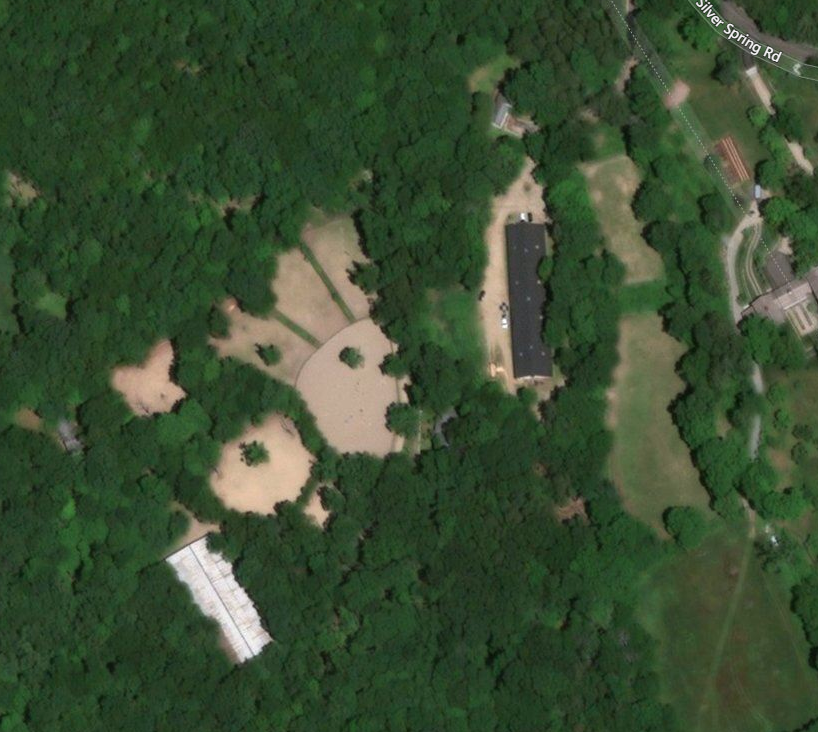
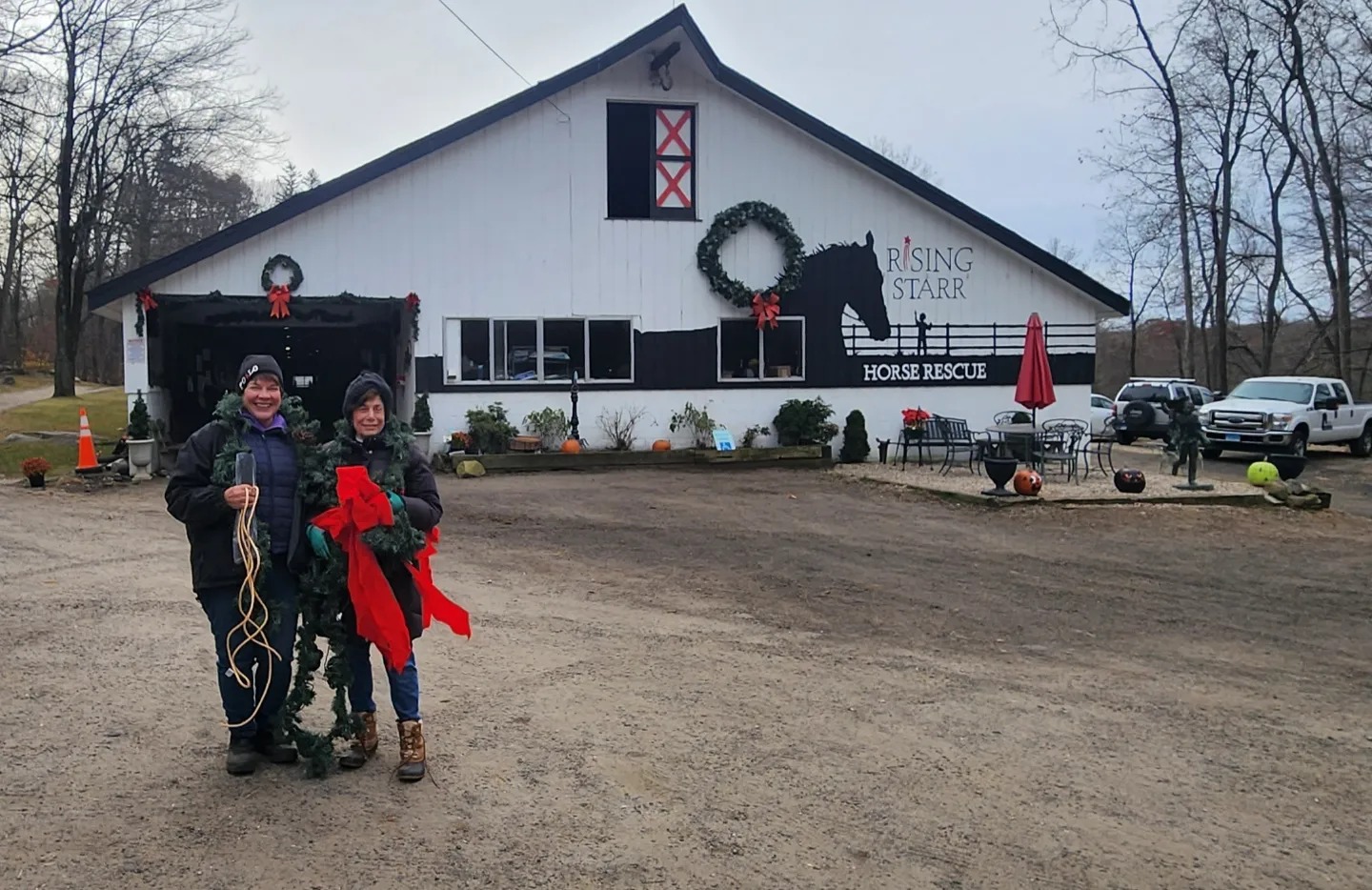
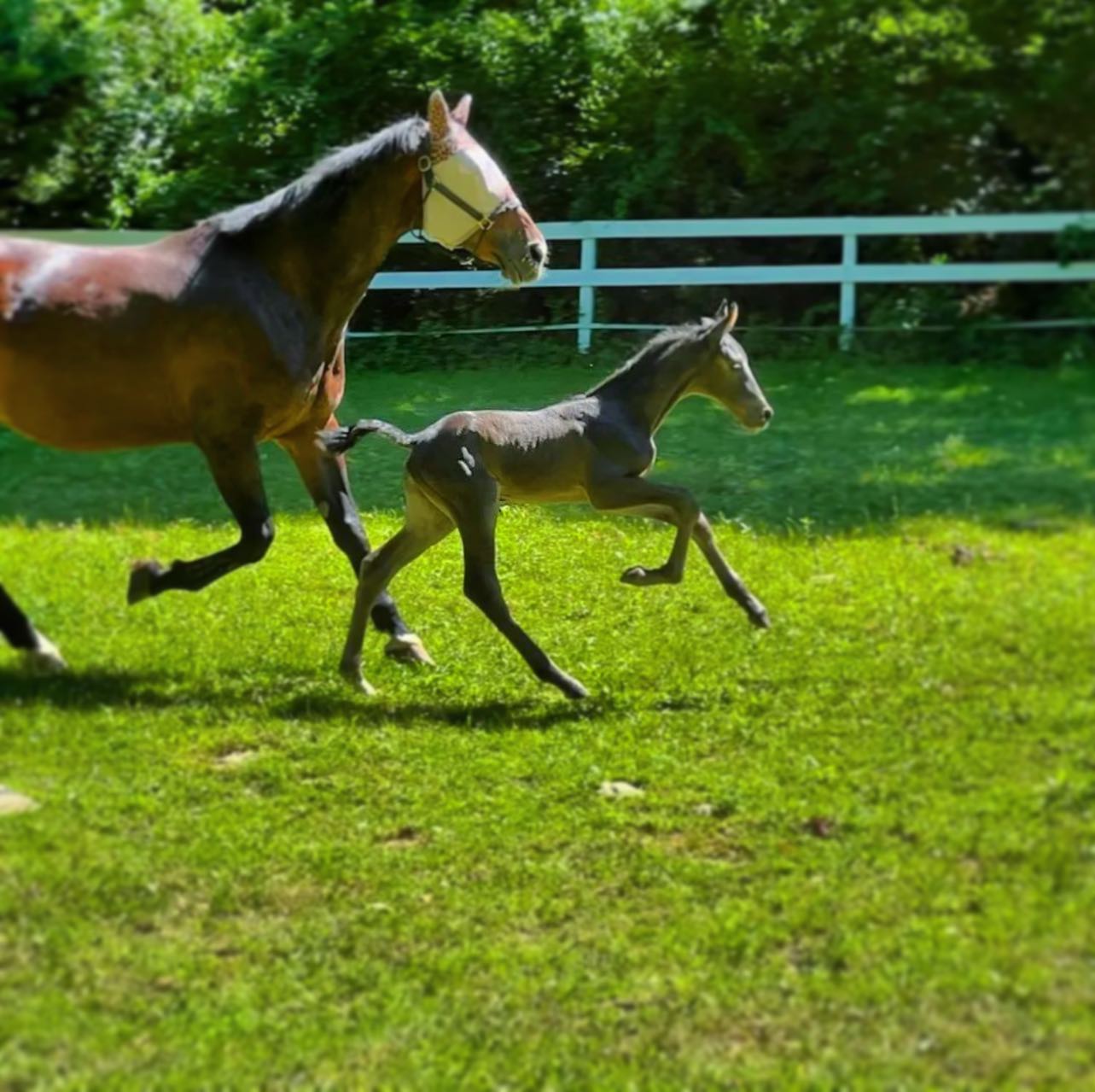
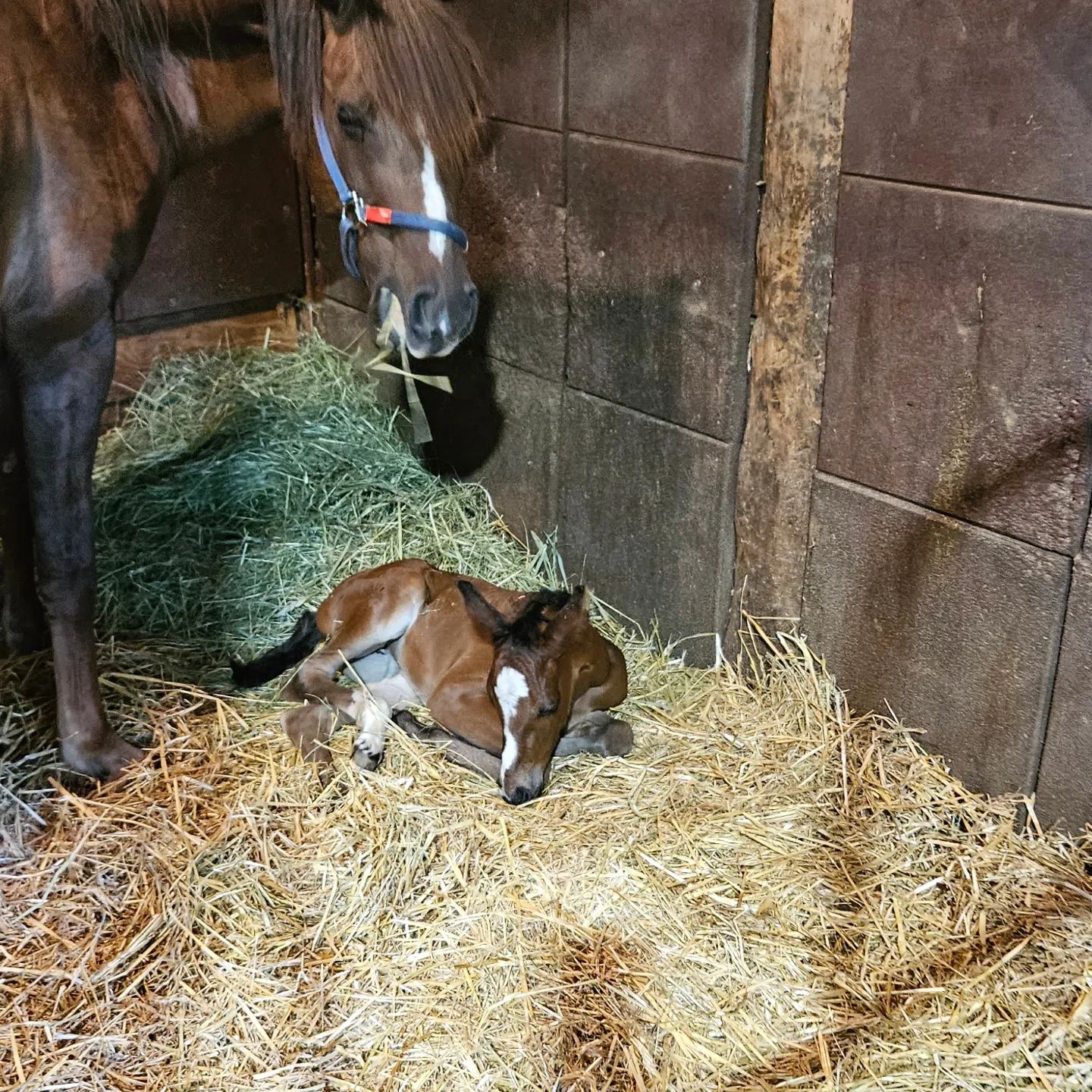
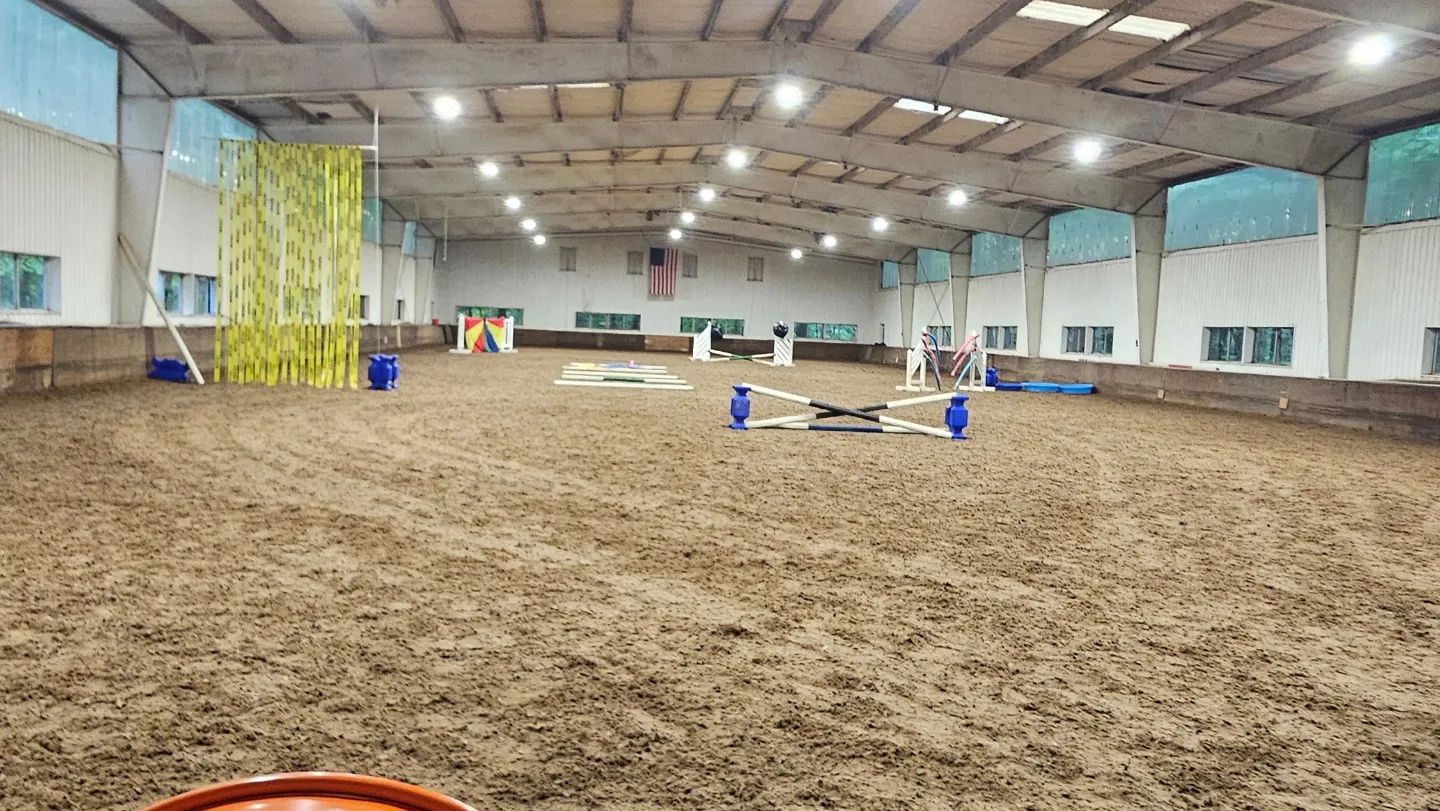


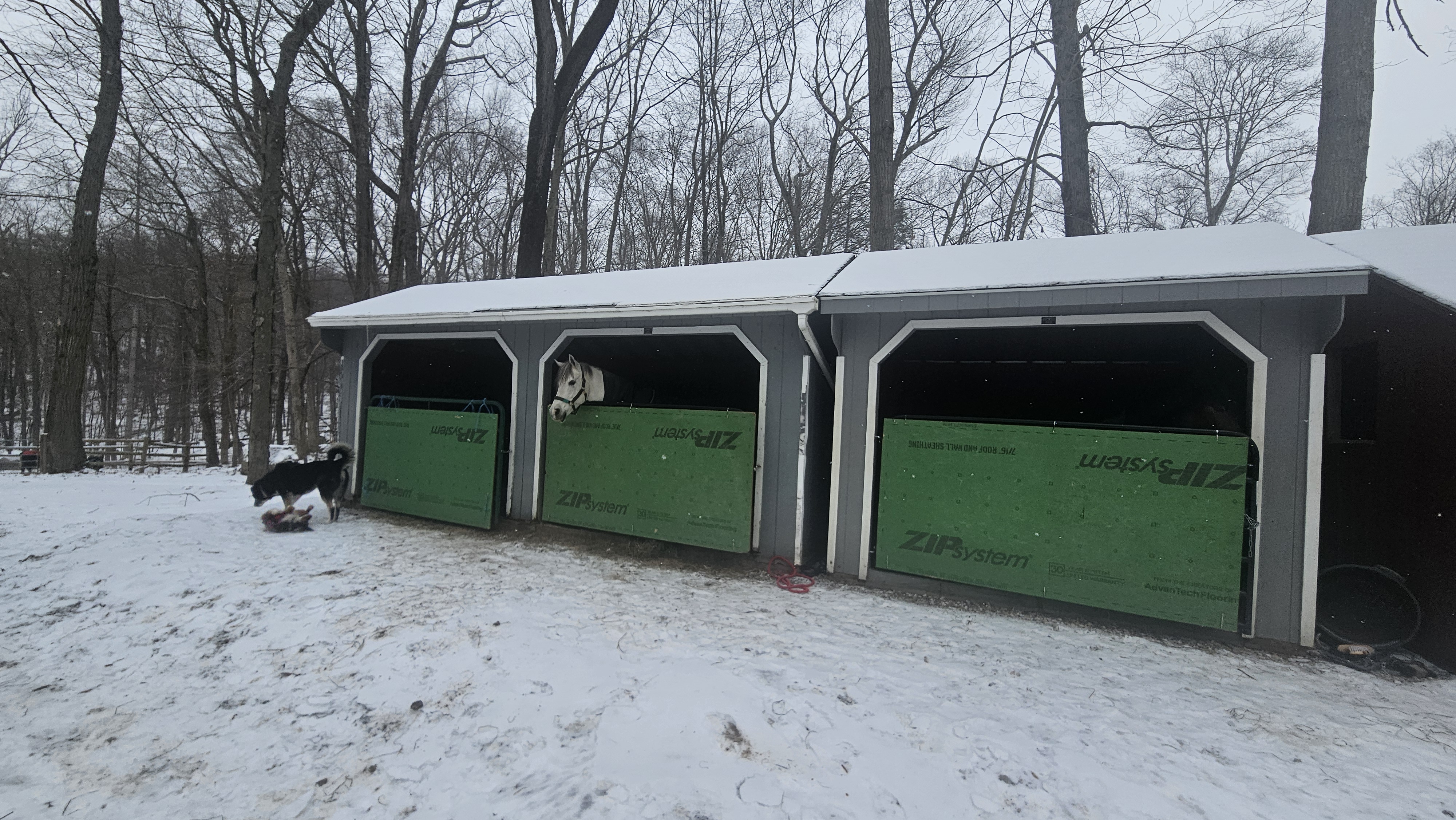
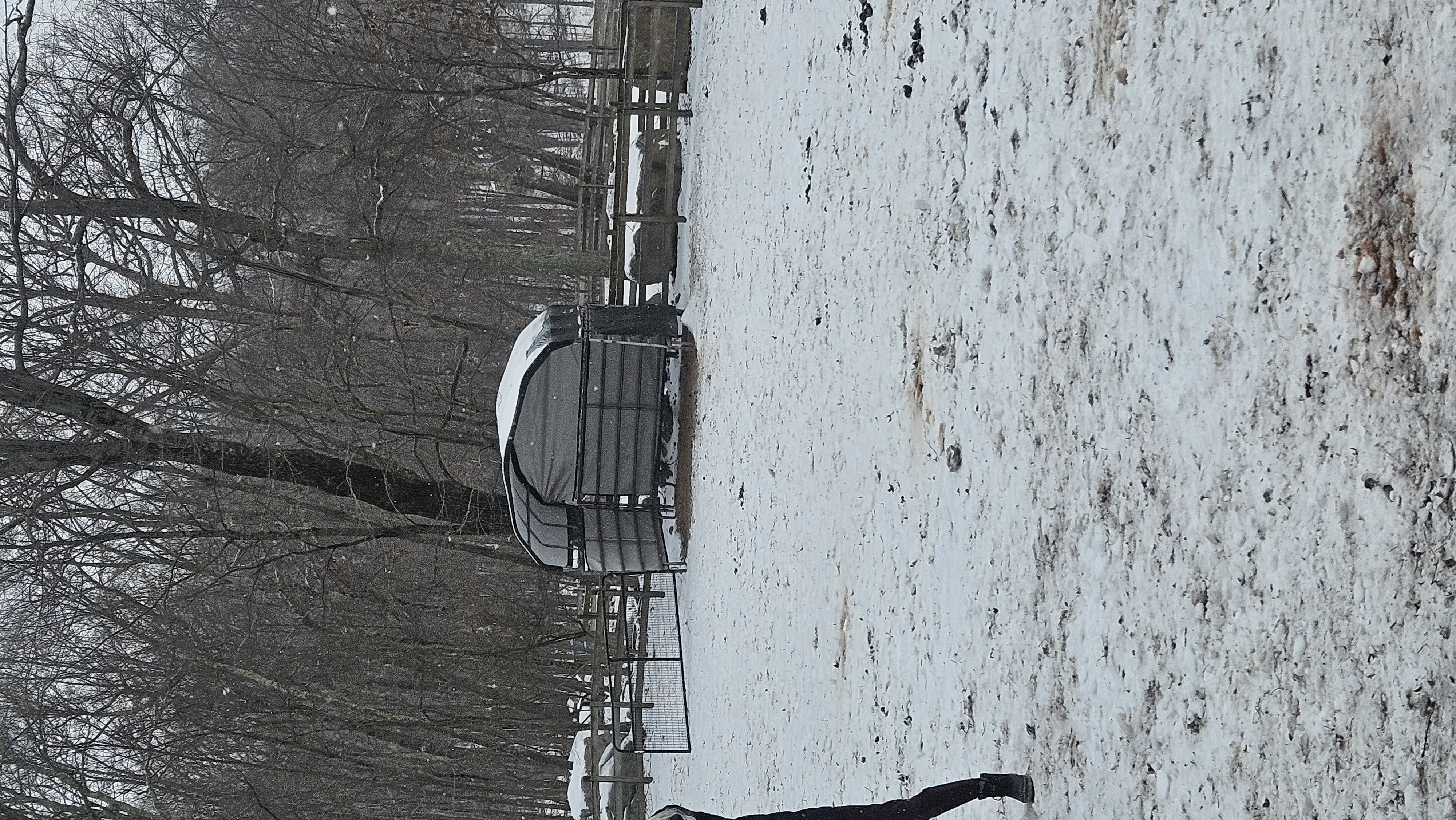
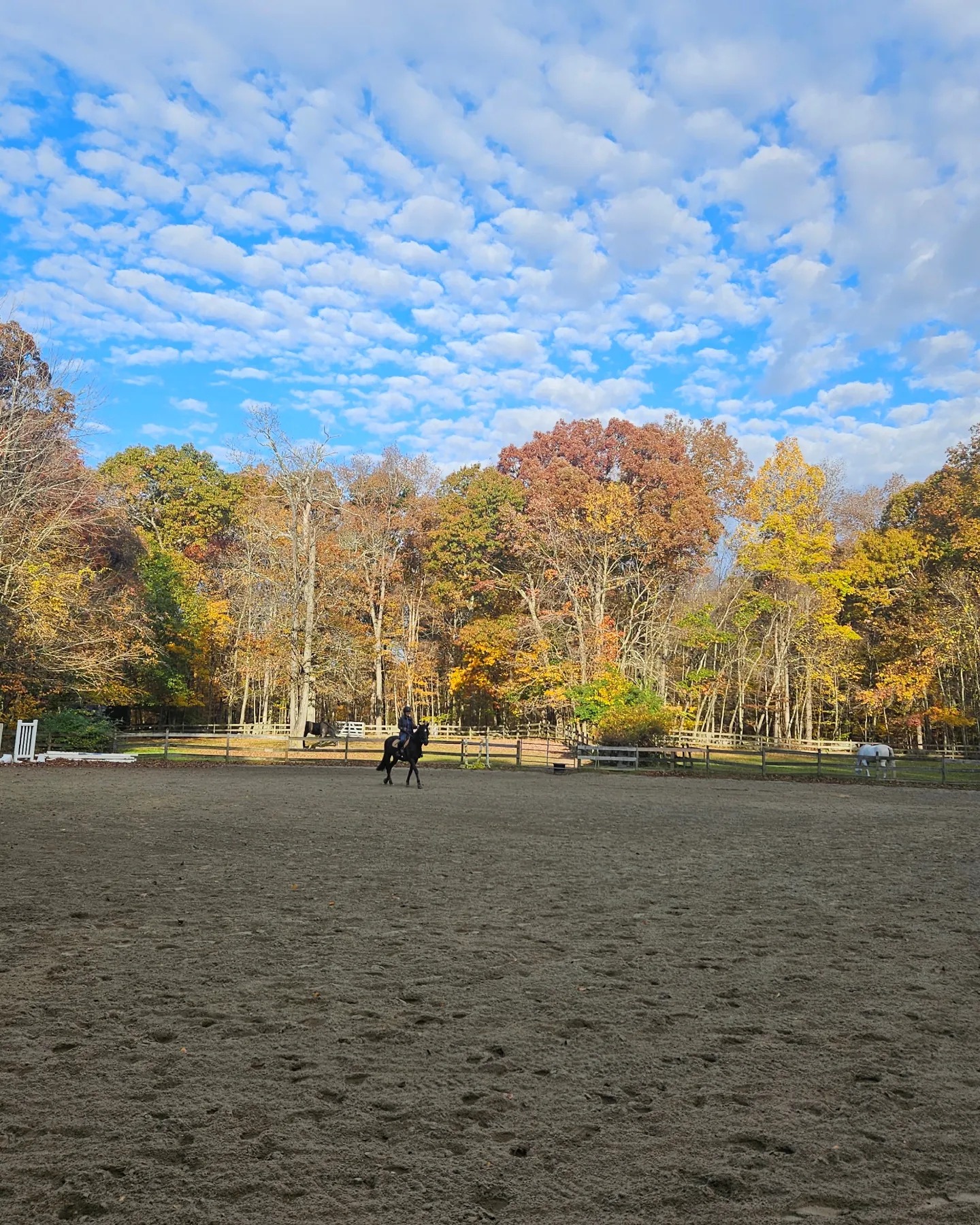

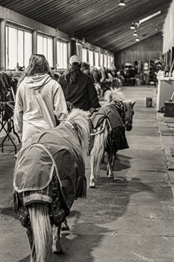
Are the organization's rules, restrictions and warnings (signage) conspicuously posted in easily accessible locations? Yes
Are the organization's emergency contacts, including veterinarian contact information, conspicuously posted in easily accessible locations? Yes
Are human and equine first aid kits easily accessible? Yes
Regarding all shelters where horses are housed including run-in sheds:
Do horses have assigned stalls in the barn/structure(s) or exclusively assigned shelter locations where they are separated from other horses with a barrier? Yes
How many hours per day, on average, are horses stalled or restricted to these sheltered exclusive shelter locations? 9-12
How often are the stalls/shelters cleaned, i.e., kept in good repair and free of standing water, accumulated waste, sharp objects and debris? 6-7 Days a Week
Do all stalls/shelters allow horses to lie down, stand up and turn around and provide protection from inclement weather (wind, sleet, rain, snow and extreme temperatures)? Yes
Are stalls/shelters kept in good repair, with adequate ceiling height, and free of standing water, accumulated waste, sharp objects and debris? Yes
Are floors constructed and maintained for both good drainage and traction? Yes
Is there a ventilation and circulation system in place to allow free flow of air to control temperature, and humidity, and to prevent air stagnation? Yes
Is wiring inaccessible to horses and maintained for safety in all areas of facility? Yes
Are fire prevention/protection measures (fire alarms, extinguishers and sprinkler systems) maintained and in good working order? Yes
Is there adequate lighting to ensure safety in all areas of facility? Yes
How many hours per day, on average, are horses turned out:
Equines are out 4 to 8 hours per day
Equines are out 9 to 15 hours per day
Equines are out 24/7
Equines are out 24/7 except they are brought in to feed
Equines are out 24/7 except they are brought in if there is inclement weather
Equines are out 24/7 except when they are being trained
Equines are out 24/7 except when they are used for the conduct of the organization's programs
The following describes the pastures at this facility:
This facility has a written plan in place for pasture management, which includes guidelines for seeding, fertilizing, irrigation, mowing, dragging, harrowing, manure removal, removal of debris, the control of poisonous plants, and a schedule for cleaning
A dedicated staff person(s) is responsible for pasture management
All pastures are fenced to prevent escape or injury
Electric fencing is used; electric wires or tape fence are visibly marked
Fencing checks, such as broken or missing planks, loose fence posts, exposed or loose nails, detached wires, etc., are done regularly
Pastures are rotated
Pastures have natural protection for equines (i.e., trees)
Pastures have man-made protection for equines (i.e., shelters)
This facility does not have pastures where equines can graze on pasture grass
Barbed wire is used for fencing
The following describes the turnout areas other than pastures at this facility:
This facility has a written plan in place for the maintenance of turnout areas, which includes a schedule for cleaning, manure removal, and dragging
A dedicated staff person(s) is responsible for the maintenance of turnout areas
All turnout areas are fenced to prevent escape or injury
Turnout areas have man-made protection for equines (i.e., shelters)
Fencing checks, such as broken or missing planks, loose fence posts, exposed or loose nails, detached wires, etc., are done regularly
This facility does not have turnout areas
Barbed wire is used for fencing
Electric fencing is used; electric wires or tape fence are visibly marked
The following policies and procedures are in place at the facility to restrict public access and to keep horses safe:
The property owner, staff member or caretaker lives on the premises and ensures that public access is restricted and is responsible for the security of the facility and equines
There is a practice in place to monitor equines overnight
No Trespassing signs are posted
Hold Harmless signs are posted
Authorized Personnel Only signs are posted
Entrance gates are locked at night
Visitors are only permitted at specific times
Visitors are only permitted in specific areas
The property is fitted with motion lights
The property is fitted with a security system monitored by police or a professional service
The property is fitted with a security system that is monitored internally by staff (or the property owner)
A security guard is present at night
By Appointment Only signs are posted.
The perimeter of the property is fully fenced
Equine Care/Emergency Preparedness: Rising Starr Horse Rescue (*Main) 2026 and 2025 This section is required.
Horse Health Care/Barn Management Records: What system is used to collect and store health/horse care records?
Onsite computer with onsite backup storage system
Onsite computer with cloud-based backup storage system
Our organization utilizes a software application to maintain records
The organization utilizes its own system to maintain records
Our organization would use free cloud-based barn management software if available
The following items are consistent with our feed management plan and practices:
Equines are provided with individualized feeding plans, including supplements, according to the equine's age, breed/type, condition, size, work level and any health issues, consisting of nutritious food provided in sufficient quantity and access to adequate natural forage, or be fed daily, or as recommended by the organization's veterinarian
Feed plans are determined in consultation with a veterinarian
Supplement plans are determined in consultation with a veterinarian
Equines are fed grain in individual stalls
Staff and/or volunteers are trained in proper feed measurements and protocols and observed periodically to ensure they are feeding correctly
The feed chart is centrally located and updated as needed
The area(s) where hay, feed, grain, and supplements are stored are kept clean, free of debris and chemicals, and protected from weather and other animals in rodent-proof and mold-proof containers and grain bins
Feed, supplements and hay types are clearly labeled
Water sources, i.e., buckets, troughs, automatic waterers, etc. are kept clean, free of contaminants, debris and chemicals, protected from weather and other animals, and be positioned or affixed to minimize spillage.
Medications are kept in a secure area
Equines are fed grain in groups
Is clean, potable water available at all times for all equines, or if not at all times, at least twice daily? Yes
Hoof Care: How often is hoof care provided for each equine? Every 4-8 weeks and when an issue arises
Dental Care: How often is dental care provided for each equine? Annually and when an issue arises
Horse checks: How often are equines visually and physically checked by personnel at the facility? Every day or 6 days a week
Our organization has the following parasite and fly/insect control protocols in place, including remedies used to control flies and insects:
Our organization follows the parasite control guidelines of our veterinarian, including fecal testing and de-worming
Fly/Insect Control Remedies:
Fly parasites
Feed Through Products
Fly Traps and Tapes
Premise Sprays/Insecticides
Fly Spray Repellent
Fly Masks
Fly Sheets
Fans
The following represent the biosecurity practices in place at facility:
Our organization follows the biosecurity guidelines of our veterinarian
Sick, affected and/or quarantined equines do not have contact with other equines or other animals
The organization has a written biosecurity plan
Staff are trained in best practices related to biosecurity
Volunteers are trained in best practices related to biosecurity
A specific individual is trained and assigned to care for sick, affected and/or quarantined equines
Sick, affected and/or quarantined equines are cared for last if the caretaker must also care for healthy equines
Restricted access signs are posted at primary points of access to sick, affected and/or quarantined equines
Hand sanitizers are available at all primary points of access to sick, affected and/or quarantined equines
Footbaths are available at all primary points of access to sick, affected and/or quarantined equines
Manure and bedding from sick, affected and/or quarantined equines is removed from the facility - not put in open air piles, and not spread on pastures
Quarantine areas, such as stalls, aisle ways, paddocks, and common areas, are cleaned (and needed, disinfected) after conclusion of the quarantine.
Trailers/vans used by sick, affected and/or quarantined equines are cleaned and disinfected after each use and cleaning takes place away from where equines are sheltered
Equipment used by sick, affected and/or quarantined equines is not shared
Equipment used by sick, affected and/or quarantined equines is cleaned of organic debris and disinfected after each use
Latex gloves, or equivalent gloves, are worn when working with sick, affected and/or quarantined equines
Equines are not quarantined on arrival.
Additional information on biosecurity:
With the number of volunteers active at local show barns, we often will have foot baths at the doors during the showing season. ***If any equipment thermometer, Ultrasound, laser, or other equipment the farm has for horse care not specific to one horse would be properly cleaned to ensure no sickness is spread.
The following represent the manure removal practices in place at facility:
Manure is stored in dumpster(s)
Manure is hauled, sold or given away
Our organization adheres to the manure management guidelines set by the state, local authorities, and/or our organization's veterinarian
Manure is piled in an area where equines are not located
Manure piles are covered
Manure piles are composted or spread on pastures
The following steps are taken to help staff and volunteers readily identify each horse on the property:
Equines are assigned the same exclusive stall/shelter location each day
Name plates are located on the stall/shelter location
Equines wear halters with nametags
A notebook or binder with photos and information on each equine is easily accessible
Staff and volunteers are provided with an information packet with equine profiles, including photos and detailed descriptions
Staff/volunteers are provided training on conformation, markings, colors, and breeds
Team leaders work with new staff/volunteers until they are able to identify the equines
Photos are located on the stall/shelter location
A map/diagram is posted showing the location of each equine with equine names and photos
Equine photos and profiles are available on the website
Our organization has the following policies and procedures in place pertaining to tack, apparel and equipment:
All equines have specifically assigned tack, apparel and equipment that is not shared
Tack is cleaned after each use
Tack is inspected for overall working condition before each use by trained personnel
Tack is assessed for fit before each use by trained personnel
Tack is assessed for fit by trained personnel when an equine's body condition changes
Tack is assessed for fit by trained personnel when an equine's disposition changes
This facility enlists the services of a professional saddle fitter at least once a year
Assigned tack is clearly labeled
Tack is stored in a climate-controlled location
Helmets are shared
Helmets are cleaned/disinfected after each use
Helmets are replaced after a fall
Helmets are replaced at least every five years.
Saddles are shared
Saddle pads are shared
Bridles are shared
Bits are shared
Blankets are shared
Sheets are shared
Turnout apparel is shared
Blankets, sheets and turn out apparel are fitted and utilized for each equine appropriate to the equine's needs and the weather conditions
Blankets, sheets and turn out apparel are cleaned regularly as needed
Halters are shared
Tack is cleaned weekly
Tack is cleaned only when needed
No equines are ridden; saddles, bridles, etc. not applicable.
Emergency Preparedness: Rising Starr Horse Rescue: *Main This section is required.
The following plans, policies, and procedures are in place at the facility to handle emergencies and address weather related issues, fire safety procedures, and/or any additional hazardous scenarios the facility could potentially experience:
Emergency procedures are posted prominently
The facility owns or has access to a generator
The facility maintains at least two weeks of hay, feed, shavings and medications
The facility collects and maintains medical information from staff, volunteers, and clients
The facility maintains appropriate liability and/or workers' compensation insurance
The organization has a written emergency preparedness/safety plan (EPP)
Local fire department and/or the state's emergency planning department procedures
Medical emergencies for clients, staff, and volunteers
Medical emergencies for equines
Evacuation plans
Power outages
Fire
Natural Disasters - thunderstorm, hurricanes, earthquakes, tornados, etc
Terrorist attacks
Protocols to notify emergency personnel
Building/facility exit plans
The facility follows the specific procedures to help PREVENT emergency situations:
Smoking is strictly prohibited
NO SMOKING signs are posted prominently
Hay is stored away from permanent or temporary structures where equines are stalled
Permanent or temporary structures where equines are stalled are kept free of dust, cobwebs, trash, cleaning rags, and other flammable items
Aisles and doorways are kept clear
Heaters with automatic shutoff settings are used
How often are the following checked or performed?
Fire Extinguishers are checked: Annually
Smoke detectors are checked: Quarterly
Fence lines are checked: Daily
Turnout Areas are checked: Daily
Sprinkler systems are checked: Quarterly
Fire drills are conducted: Semi-annually
Review of safety protocols with staff are conducted: Quarterly
Review of safety protocols with volunteers are conducted: Quarterly
The Emergency Preparedness Plan is reviewed and updated: Quarterly
Equine Transportation: 7= Onsite: 2 (2 + 0) + Offsite: 5
2-horse van/trailer with truck:
1 Owned onsite 1 Access offsite;
4-horse van/trailer with truck:
1 Owned onsite 1 Access offsite;
6-horse van/trailer with truck:
1 Access offsite;
8-horse van/trailer with truck:
1 Access offsite;
10-horse van/trailer with truck:
1 Access offsite;
GOVERNANCE, MANAGEMENT & FINANCIAL REPORTING
Financial ReportingBudget: $1M to $2M **Budget Size Error Total Expense:
Month Fiscal Year Ends: *Missing
Type of Financial Reporting (Audit, Review, Compilation): Audit
Type of IRS Filing (990, 990-EZ, 990-N): 990
Governing Body:
Board meetings per year: 5
Number of Board Members: 10 Number of Voting Board Members: 10
Board Compensation:
Is the Board Chair compensated? No Is the Treasurer compensated? No
Are there any other Voting Board Members that are compensated? No
Board/Staff Relationships:
Are any members of the Board, Staff or Program Participants related to each other through family or business relationships? Yes
If yes, provide the name, title, responsibility and family/business relationship of each Board, Staff member and/or Program Participant.
Kelly Stackpole, Founder and Executive Director, and Megan Robertson, board member, are sisters. The Treasurer, Ron Fontana, and board member, Nancy Fontana, are marrried.
Board/Staff Affiliations:
Are any Board members providing services to your organization or compensated by your organization, or are any Board members or staff members associated with and/or compensated by another organization with a relationship or business affiliation to your organization? No
Conflict of Interest:
Does your organization have a written conflict of interest policy that ensures that any compensated board member is a NON-VOTING (Independent) board member or that any compensated board member or any board member related to a compensated staff member, independent contractor, or any related board members, or any individual or organization that might benefit from a board decision, abstains from voting on issues impacting such compensation and requires officers, directors or trustees, and key employees to disclose at least annually in writing interests that could give rise to conflicts? Yes
Compliance:
Below is a list all local, state and federal licenses held by the organization, and/or accreditations or compliances with the published standards of an accrediting organization, if applicable: No licenses are required at the local, state or federal level
Organization documents available on our website:
Most recent IRS Form 990
Most recent Annual Report
Adoption/Foster Agreement
Volunteer Handbook
Organization documents available on request:
Most recent Financials
Most recent IRS Form 990
Most recent Annual Report
Equine Intake Guidelines
Adoption/Foster Agreement
Volunteer Handbook
Staff Handbook
Bylaws
Staff & Volunteers:
Chief Staff Officer (CSO): Kelly Stackpole Executive Dir.
Employees/Independent Contractors: Full-Time: 6 Part-Time: 4 Volunteers: 85
Staff Recruitment, Screening and Training processes including employees and independent contractors:
Prospective staff/independent contractors complete a written application/agreement
Our organization has a practice in place to ensure that the organization has sufficient knowledge of the background of prospective staff and independent contractors that may impact the safety of your clients and your horses, such as whether prospective staff/independent contractors serving in the capacity as staff have been convicted of a sexual offense or convicted for animal cruelty or neglect. Such practices must comply with local, state, and federal mandates.
Staff and/or contractors are required to complete a Liability Release/Hold Harmless Agreement
Staff and/or contractors are required to provide Emergency Medical Information
Staff and/or contractors are required to sign a Photo Release
Prospective staff/independent contractors are required to undergo a Background Check
Staff and/or contractors provide parent/guardian information if applicable
Staff and/or contractors carry current health insurance
Staff and/or contractors have a written job description
Staff and/or contractors are evaluated on an annual and as needed basis or with any change in their job description
Staff and/or contractors are updated on all the organization's policies and procedures on an annual and as needed basis or with any change in policy or procedure
Staff and/or contractors receive training that includes safety guidelines, confidentiality, equine handling, equine identification, and emergency procedures; additional training is job specific
Staff and/or contractors have a supervisor and is responsible for keeping their supervisor up to date on work related activities
The organization provides a handbook ((available either online or in print) to every member of the staff, including employees and/or independent contractors serving in staff positions;
The handbook includes information, such as hours of work, vacation, sick leave, dress code, cell phone usage, and the protocol for dismissal
The handbook is reviewed annually and updated
One or more staff members or contractors are trained in CPR and human first aid
One or more staff members or contractors are trained in equine first aid
Staff and/or contractors are subject to Random Drug Screening
Volunteer Recruitment, Screening and Training processes:
Prospective volunteers complete a written application/agreement
Our organization has a practice in place to ensure that the organization has sufficient knowledge of the background of prospective volunteers that may impact the safety of your clients and your horses, such as whether prospective volunteers have been convicted of a sexual offense or convicted for animal cruelty or neglect. Such practices must comply with local, state, and federal mandates.
Volunteers required to complete a Liability Release/Hold Harmless Agreement
Volunteers are required to provide Emergency Medical Information
Volunteers are required to sign a Photo Release
Prospective volunteers are required to undergo a Background Check
Volunteers provide parent/guardian information if applicable
Volunteers carry current health insurance
Volunteers have written job descriptions
Volunteers are evaluated on an annual and as needed basis or with any change in their job description
Volunteers are updated on all the organization's policies and procedures on an annual and as needed basis or with any change in policy or procedure
Volunteers receive training that includes safety guidelines, confidentiality, equine handling, equine identification, and emergency procedures; additional training is job specific
Volunteers are assigned a supervisor (staff member and/or senior volunteer) and is responsible for keeping their supervisor up to date on work related activities
The supervisor assesses the volunteer's abilities and assigns specific duties to the volunteer based on their skills
The organization records and maintains written attendance information and hours on every volunteer
The organization provides a Volunteer Handbook to every volunteer
The Volunteer Handbook (available either online or in print) includes volunteer-related information, such as hours of work, dress code, cell phone usage, and the protocol for dismissal
The Volunteer Handbook is reviewed annually and updated
The organization holds regular orientation sessions for volunteers and prospective volunteers that includes an overview of the organization, its mission, activities, volunteer responsibilities and expectations, safety guidelines, and a tour of the facility
Volunteers are subject to Random Drug Screening
© Copyright 2018 EQUUS Foundation 1601 5.00
